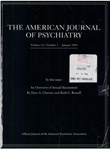An empirical evaluation of the Global Deterioration Scale for staging Alzheimer's disease [published erratum appears in Am J Psychiatry 1992 Aug;149(8):1129]
Abstract
OBJECTIVE: Although the Global Deterioration Scale has been widely used since its publication in 1982, its stages are based on implicit assumptions about the linearity, temporality, and interdependence of cognitive, functional, and behavioral impairment in Alzheimer's disease. The authors evaluated the validity of these assumptions and tested the hypothesis that psychopathology and functional impairment would occur in earlier stages than the Global Deterioration Scale predicts. METHOD: The analyses were based on data on 324 patients with Alzheimer's disease who were selected from a registry of such patients. Data analyses included 1) descriptive statistics on the frequency of psychiatric symptoms and difficulties with activities of daily living and 2) logistic regression, with symptoms and functional impairment as independent variables, to test for significant changes in patients' status between stages of the Global Deterioration Scale. RESULTS: More than 50% of the patients at stage 2 displayed psychopathology, and 32% had two or more symptoms. The significant increase in psychiatric symptoms occurred between stages 3 and 4, not between stages 5 and 6 as predicted by the Global Deterioration Scale. Impairment in functional status was observed at all stages, and significant increases occurred between stages 3 and 4 as well as between stages 5 and 6. CONCLUSIONS: Psychiatric symptoms and functional impairment occur earlier than predicted by the Global Deterioration Scale, and the rate of change is also different from that specified in the scale. Separate scales to describe cognitive, clinical, and functional status may be the best way to describe the illness until better multidimensional instruments are developed.
Access content
To read the fulltext, please use one of the options below to sign in or purchase access.- Personal login
- Institutional Login
- Sign in via OpenAthens
- Register for access
-
Please login/register if you wish to pair your device and check access availability.
Not a subscriber?
PsychiatryOnline subscription options offer access to the DSM-5 library, books, journals, CME, and patient resources. This all-in-one virtual library provides psychiatrists and mental health professionals with key resources for diagnosis, treatment, research, and professional development.
Need more help? PsychiatryOnline Customer Service may be reached by emailing [email protected] or by calling 800-368-5777 (in the U.S.) or 703-907-7322 (outside the U.S.).



